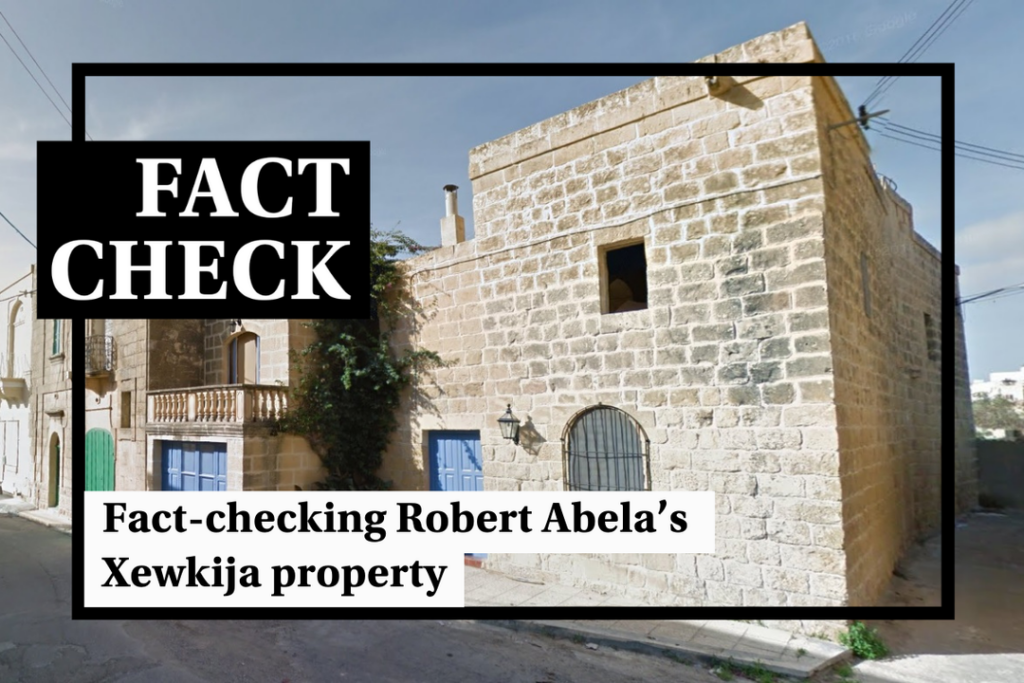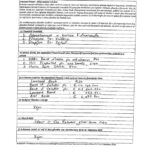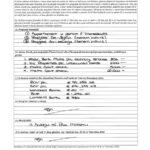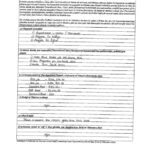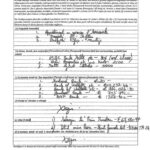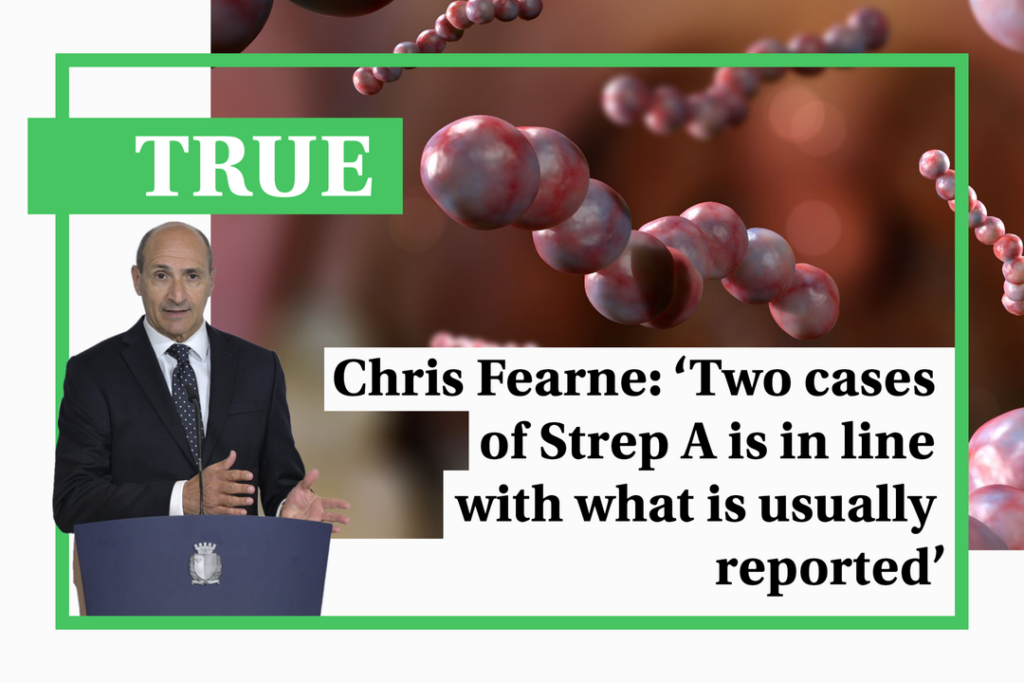A property – or number of properties – in Gozo owned by Prime Minister Robert Abela and his wife Lydia made headlines in recent weeks, with questions raised over whether Abela had declared their purchase in his annual declaration of assets.
A series of reports by The Shift said that Abela had failed to declare the properties in his annual personal wealth declarations, questioning a €180,000 discrepancy in his declarations.
Meanwhile, former book council chair Mark Camilleri published a series of blog posts last November saying that Abela had bought over €300,000 worth of property in Gozo with “undeclared capital”. This land, Camilleri said, was paid for through Lydia Abela’s BOV bank account.
These reports prompted independent candidate Arnold Cassola to write to the Standards Commissioner asking for the issue to be investigated.
When questioned about the issue last week, Abela claimed to have declared all his property, saying that the properties referred to in media reports were, in reality, all the same property.
“It is the same property, a property that was bought across different contracts, one property touching the other. It is a property in Xewkija that was declared in the clearest way possible”, Abela said.
Times of Malta received several requests from readers asking whether Abela’s property in Xewkija is a single property or several individual properties.
What is this all about?
The root of the issue dates back to the purchase of a farmhouse in the village of Xewkija in Gozo in 2010, shortly after the couple married but long before Abela entered parliament in 2017. The farmhouse was reportedly bought for €268,000.
A few years later, in 2012, Lydia Abela applied for a development permit to extend part of the farmhouse’s ground floor and build a pool in the garden. Although the permit was approved (and, in 2017, extended), the works were never carried out.
Things remained in place until 2022, when the couple bought a tract of vacant land, some 500 square metres in size, just behind the farmhouse. Registry documents show that they paid €180,000 for the land.
A little under a year later, in January 2023, Robert and Lydia Abela bought another piece of empty land behind their farmhouse. This land was a little larger in size than the first, roughly 842 square metres, and set them back €135,000.
So are they three properties or one?
This is where the semantics become a little confusing.
There’s little doubt that they were originally three separate properties, owned by different people and serving different functions.
The farmhouse that the Abelas purchased in 2010 was a standalone property used as a residence.
The two tracts of land that they bought in 2022 and 2023 did not form part of the same property and were each owned by different people, as their respective deeds show.
However, it’s also true that the whole point of buying this land was to incorporate it into the farmhouse to end up with a single, larger, property.
The two plots of land are directly connected to the farmhouse and will essentially be used as an outdoor extension of the original farmhouse.
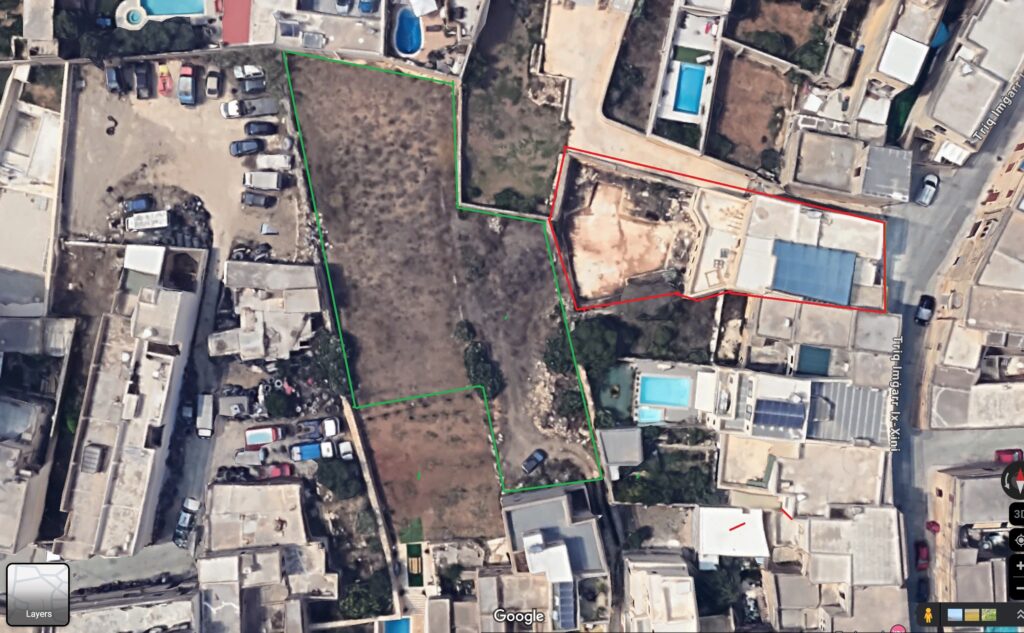
An application to develop the farmhouse submitted by Lydia Abela last year, and granted by the Planning Authority earlier this month, reveals what they plan to do with the land purchased in 2022 and 2023.
The farmhouse will be converted into an eight-bedroom guesthouse, with the outdoor space – the land that was purchased – used to house a large pool and an extensive garden, all as part of the same complex.
Did Abela declare the property?
This question is likely to form the basis of the Standard Commissioner’s investigation.
What is certain is that Abela did declare that he owned property in Xewkija when filing his annual declaration of assets ever since he took the helm of the country, but made no effort to disclose that the property grew significantly larger.
In fact, the properties he listed between 2019, when his first declaration of assets was filed, and the latest in 2022 remain virtually unchanged. In each, he listed an apartment and garage in Marsascala, property in Żejtun, and property in Xewkija.
The only slight change is that in his most recent declaration, Abela clarifies that the Żejtun and Marsascala properties are jointly owned (sehem indiviż).
Did he need to declare each purchase separately?
Again, this is something that the Standards Commissioner will ultimately decide upon.
Cabinet guidelines on the matter are rather vague.
The Cabinet’s Manual of Procedures, which lays out how Cabinet members are to declare their personal wealth simply instructs ministers to declare “immoveable property that is the Minister’s property or upon which the Minister has some type of title”, together with other financial assets and income.
They also need to declare properties owned by their spouses if this property is part of their community of assets, that is, if the couple haven’t agreed to keep their assets separate from one another.
The manual does not specifically state that additions to a property need to be declared, nor does it instruct Cabinet members to also list the value of the properties they own. Had such a requirement been in place, Abela would have had to list that his Xewkija property had increased in value following the purchase of new land.
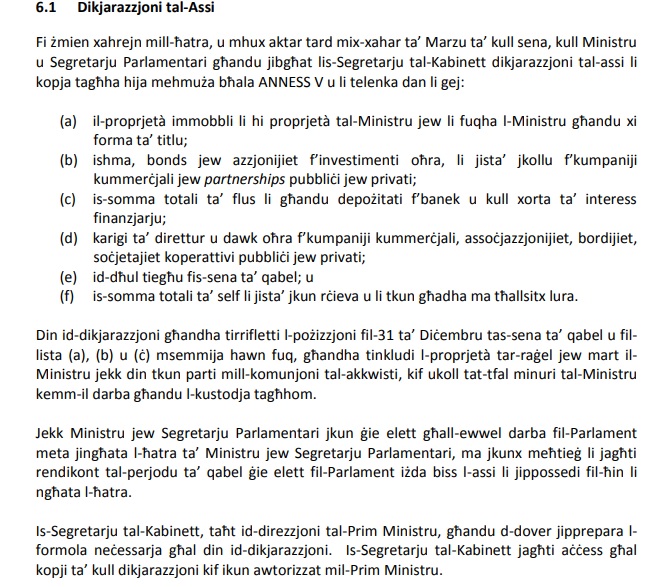
Abela’s declaration of assets is not too dissimilar to that of many other members of Cabinet.
Some choose to provide more detail (Ian Borg lists the date when each of his properties was acquired, for instance, while Clint Camilleri gives a thorough breakdown of all his properties). But many others are just as vague, simply listing the locality in which their property is located.
The property has ‘one address’: OPM
Replying to Times of Malta‘s questions, a Prime Minister spokesperson said that the property “has one address” and that it is “correctly indicated in the declaration of assets and fulfils the requirements of these declarations”.
The spokesperson said that after the report to the Standards Commissioner, proceedings “should be allowed to take their course”.
“It has unfortunately become standard practice to inundate this Office with vexatious and frivolous complaints, owing to the currently applicable law which allows the filing of such baseless complaints”, the spokesperson added.
The spokesperson did not specifically address questions about how the land purchases were paid for, simply saying that the relevant information related to the properties is “already in the public domain”, including in publicly available deeds.
When asked about the issue last week, Abela said that the purchases were carried out by cheque, seemingly confirming reports that they were paid for through Lydia Abela’s account.
Verdict
The Xewkija property owned by Robert and Lydia Abela was originally three separate, distinct properties owned by three different owners.
One of the properties – a farmhouse – was purchased by Robert and Lydia Abela in 2010. The other two are unbuilt fields right behind the farmhouse that they purchased years later.
All three properties are connected and have been incorporated into a single property, with a single address. Development plans show that the fields will be transformed into a garden and pool area.
Cabinet rules say that members of Cabinet need to declare the property they own, but do not clearly spell out whether additions to the property need to be declared. Nor do they say that the value of the property needs to be listed.
The Times of Malta fact-checking service forms part of the Mediterranean Digital Media Observatory (MedDMO) and the European Digital Media Observatory (EDMO), an independent observatory with hubs across all 27 EU member states that is funded by the EU’s Digital Europe programme. Fact-checks are based on our code of principles.
Let us know what you would like us to fact-check, understand our ratings system or see our answers to Frequently Asked Questions about the service.

